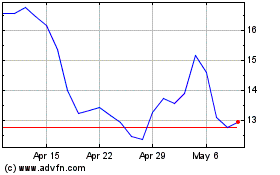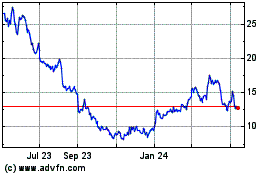Enanta Announces JAMA Publication of Results from AbbVie’s Study of VIEKIRA PAK™ (ombitasvir, paritaprevir, ritonavir tab...
February 23 2015 - 11:17AM
Business Wire
- In adult patients co-infected with
genotype 1 (GT1) hepatitis C virus (HCV) and human immunodeficiency
virus type 1 (HIV-1), using VIEKIRA PAK with ribavirin (RBV),
(TURQUOISE-I Study) demonstrated sustained virologic response rates
12 weeks post-treatment (SVR12) of 94 percent with 12 weeks of
treatment and 91 percent with 24 weeks of treatment,
respectively
- Regimen contains Enanta’s lead protease
inhibitor, paritaprevir
- Additional sub-analyses of TURQUOISE-I
data to be presented this week at the Annual Conference on
Retroviruses and Opportunistic Infections (CROI)
Enanta Pharmaceuticals, Inc. (NASDAQ:ENTA), a research and
development-focused biotechnology company dedicated to creating
small molecule drugs for viral infections and liver diseases, today
announced that results from part one of the Phase 2 portion of
AbbVie’s Phase2/3 open-label study, TURQUOISE-I, in genotype 1
chronic hepatitis C patients with human immunodeficiency virus type
1 (HIV-1) co-infection were published online in The Journal of the
American Medical Association (JAMA). Additional sub-analyses also
will be presented in both oral and poster presentations on Feb. 26,
at the Annual Conference on Retroviruses and Opportunistic
Infections (CROI) in Seattle, Washington.
As published today in JAMA, and originally presented at The
Liver Meeting®2014, the TURQUOISE-I study showed patients
co-infected with genotype 1 (GT1) hepatitis C virus (HCV) and HIV-1
receiving VIEKIRA PAK™ (ombitasvir, paritaprevir, ritonavir
tablets; dasabuvir tablets) and ribavirin (RBV) for 12 weeks or 24
weeks achieved sustained virologic response rates 12 weeks
post-treatment (SVR12) of 94 percent (n=29/31) and 91 percent
(n=29/32), respectively. The SVR12 rates were 91 percent (n=51/56)
for subjects with HCV GT1a infection and 100 percent (n=7/7) for
those with HCV GT1b infection.
Paritaprevir is Enanta’s lead protease inhibitor identified
within the ongoing Enanta-AbbVie collaboration and is one of the
three direct-acting antivirals in the TURQUOISE-I treatment
regimen. AbbVie is responsible for all development and
commercialization activities for regimens that contain
paritaprevir.
VIEKIRA PAK is contraindicated with efavirenz (Sustiva) because
co-administration is poorly tolerated and results in liver enzyme
elevations. The ritonavir component of VIEKIRA PAK is an HIV-1
protease inhibitor and can select for HIV-1 protease inhibitor
resistance. To reduce this risk, HCV/HIV-1 co-infected patients
should also be on a suppressive antiretroviral (ART) drug regimen.
The most common adverse events occurring in at least 10 percent of
patients in TURQUOISE-I were fatigue (48%), insomnia (19%), nausea
(17%), headache (16%), itching (13%), cough (11%), irritability
(10%), and yellowing of the eyes (10%).
Sub-analyses of these data will be presented later this week at
CROI in oral and poster presentations:
- High SVR Regardless of Time to
Suppression with Paritaprevir/r/Ombitasvir & Dasabuvir +
RBVOral Presentation #147February 26, 2015, 10:30-10:45 p.m.
PST, Room 6ABAnalysis of time to HCV suppression in HCV/HIV
co-infected patients in TURQUOISE-I
- Hematologic Analysis of
Paritaprevir/r/Ombitasvir and Dasabuvir + RBV in
TURQUOISE-IPoster #691February 26, 2015, 2:30-4:00 p.m.
PST, Poster HallIn this analysis of the TURQUOISE-I study, certain
laboratory values in patients taking paritaprevir/r/ombitasvir and
dasabuvir with RBV were examined, including hemoglobin, CD4+ T
cells, and lymphocyte count
About TURQUOISE-I
TURQUOISE-I is an ongoing Phase 2/3, multi-center, randomized,
open-label study evaluating the efficacy and safety of VIEKIRA PAK
(ombitasvir, paritaprevir, ritonavir (25/150/100 mg once daily) and
dasabuvir (250 mg twice daily) with RBV (weight based dosing of
1000 mg or 1200 mg per day divided twice daily) for 12 or 24 weeks
in adult patients with chronic GT1 HCV infection with or without
compensated liver cirrhosis who are also infected with HIV-1.
Study patients were either new to therapy (treatment-naïve) or
had failed previous treatment with pegylated interferon and RBV
(treatment-experienced), had a stable immune status (CD4+ counts of
≥200 cells/mm3 or CD4+ % ≥14%). Patients were on a stable HIV-1 ART
regimen that included tenofovir disoproxil fumarate plus
emtricitabine or lamivudine, administered with ritonavir-boosted
atazanavir or raltegravir. Patients on atazanavir stopped the
ritonavir component of their HIV-1 ART regimen upon initiating
treatment with VIEKIRA PAK + RBV. Atazanavir was taken with the
morning dose of VIEKIRA PAK. The ritonavir component of the HIV-1
ART regimen was restarted after completion of treatment with
VIEKIRA PAK and RBV. Of the five patients who were non-responders,
one experienced virologic failure, one discontinued treatment, one
experienced relapse and two patients had evidence of HCV
reinfection post-treatment. Based on the results of this study,
prescribers should follow the same dosing recommendations for
mono-infected patients as outlined in the VIEKIRA PAK prescribing
information.
Elevations in total bilirubin were the most common laboratory
abnormality, were mainly composed of indirect bilirubin, and were
not associated with elevations in commonly measured liver enzymes.
Reductions in RBV dose because of anemia or reduced hemoglobin
occurred in 10 percent of patients (n=6/63); all six patients
achieved SVR12.
Protease Inhibitor Collaboration with AbbVie
In December 2006, Enanta and Abbott announced a worldwide
agreement to collaborate on the discovery, development and
commercialization of HCV NS3 and NS3/4A protease inhibitors and
HCV- protease-inhibitor-containing drug combinations. Paritaprevir
and ABT-493 are protease inhibitors identified through the
collaboration. AbbVie is Abbott’s successor under the agreement and
is responsible for all development and commercialization activities
for paritaprevir, as well as ABT-493, the collaboration’s
next-generation protease inhibitor.
About Enanta
Enanta Pharmaceuticals is a research and development-focused
biotechnology company that uses its robust chemistry-driven
approach and drug discovery capabilities to create small molecule
drugs for viral infections and liver diseases. Enanta is
discovering, and in some cases developing, novel inhibitors
designed for use against the hepatitis C virus (HCV). These
inhibitors include members of the direct–acting-antiviral (DAA)
inhibitor classes – protease (partnered with AbbVie), NS5A, and
nucleotide polymerase – as well as a host-targeted antiviral (HTA)
inhibitor class targeted against cyclophilin. In addition, Enanta
has a preclinical program in non-alcoholic steatohepatitis, or
NASH, which is a condition that results in liver inflammation and
damage caused by a buildup of fat in the liver.
Forward Looking Statements Disclaimer
This press release contains forward-looking statements,
including with respect to the prospects for AbbVie’s
paritaprevir-containing, VIEKIRA PAK + ribavirin in patients
co-infected with GT1 HCV and HIV-1. Statements that are not
historical facts are based on our management’s current
expectations, estimates, forecasts and projections about our
business and the industry in which we operate and our management’s
beliefs and assumptions. The statements contained in this release
are not guarantees of future performance and involve certain risks,
uncertainties and assumptions, which are difficult to predict.
Therefore, actual outcomes and results may differ materially from
what is expressed in such forward-looking statements. Important
factors that may affect actual results include the efforts of
AbbVie (our collaborator on paritaprevir) regarding
commercialization of regimens containing paritaprevir, market
acceptance of VIEKIRA PAK in the U.S. and other markets, the impact
of competitive products on the use and sales of those regimens, and
regulatory actions affecting clinical development of paritaprevir
and clinical development of competitive product candidates in
jurisdictions beyond the U.S. and Europe. Enanta cautions investors
not to place undue reliance on the forward-looking statements
contained in this release. These statements speak only as of the
date of this release, and Enanta undertakes no obligation to update
or revise these statements, except as may be required by law.
InvestorsEnanta Pharmaceuticals, Inc.Carol Miceli,
617-607-0710cmiceli@enanta.comorMediaMacDougall Biomedical
CommunicationsKari Watson, 781-235-3060kwatson@macbiocom.com
Enanta Pharmaceuticals (NASDAQ:ENTA)
Historical Stock Chart
From Mar 2024 to Apr 2024

Enanta Pharmaceuticals (NASDAQ:ENTA)
Historical Stock Chart
From Apr 2023 to Apr 2024
